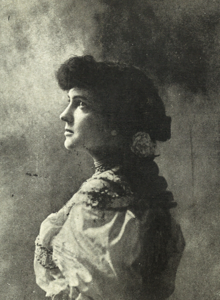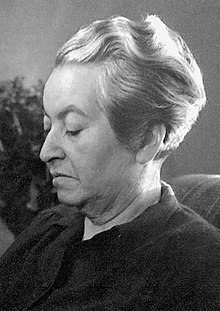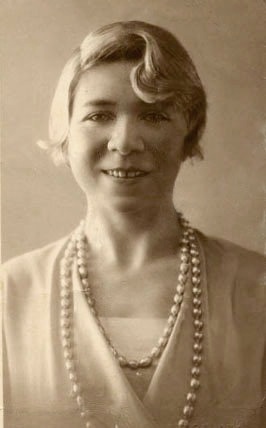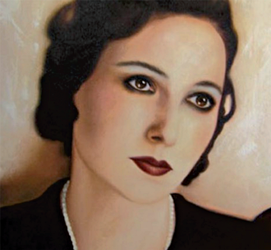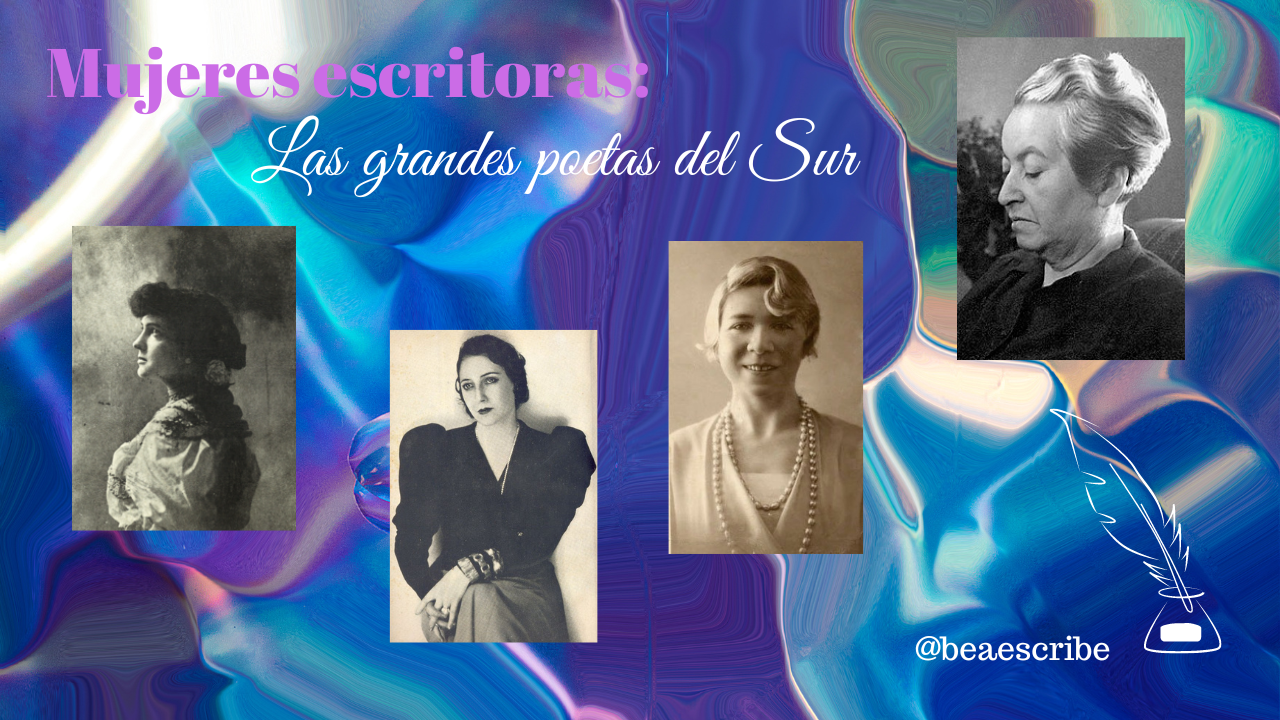
Las corrientes de Vanguardia
La Vanguardia en Hispanoamérica
Las voces femeninas latinoamericanas
Delmira Agustini
(Montevideo 1886-1914)

Obra poética
El libro blanco (1907)
Cantos de la mañana (1910)
Los cálices vacíos (1913)
El rosario de Eros (1924) Post-morten
Los rastros en el abismo (1924) Post-morten

DÍA NUESTRO
-La tienda de la noche se ha rasgado hacia Oriente-
Tu espíritu amanece maravillosamente;
su luz entra en mi alma como el sol a un vergel...
-Pleno sol. llueve fuego- Tu amor tienta, es la gruta
afelpada de musgo, el arroyo, la fruta,
la deleitosa fruta madura a toda miel.
-El Angelus- Tus manos son dos alas tranquilas,
mi espíritu se dobla como gajo de lilas,
y mi cuerpo te envuelve...tan sutil como un velo.
-El triunfo de la noche- De tus manos, más bellas,
fluyen todas las sombras y todas las estrellas,
¡Y mi cuerpo se vuelve profundo como un cielo!
(De “Los cálices vacíos”)
EL INTRUSO
Amor, la noche estaba trágica y sollozante
cuando tu llave de oro cantó en mi cerradura;
luego, la puerta abierta sobre la sombra helante,
tu forma fue una mancha de luz y de blancura.
Todo aquí lo alumbraron tus ojos de diamante,
bebieron en mi copa tus labios de frescura,
y descansó en mi almohada tu cabeza fragante;
me encantó tu descaro y adoré tu locura.
Y hoy río si tú ríes, y canto si tú cantas,
y si tú duermes duermo como un perro a tus plantas!
Hoy llevo hasta en mi sombra tu olor de primavera;
y tiemblo si tu mano toca la cerradura,
y bendigo la noche sollozante y oscura
que floreció en mi vida tu boca tempranera!
EL VAMPIRO
En el regazo de la tarde triste
Yo invoqué tu dolor…Sentirlo era
Sentirte el corazón! Palideciste
Hasta la voz, tus párpados de cera,
Bajaron…y callaste…Pareciste
Oír pasar la Muerte…Yo que abriera
Tu herida mordí en ella- ¿ me sentiste ? -
Como en el oro de un panal mordiera!
Y exprimí más, traidora, dulcemente
Tu corazón herido mortalmente,
Por la cruel daga rara y exquisita
De un mal sin nombre, hasta sangrarlo en llanto!
Y las mil bocas de mi sed maldita
Tendí á esa fuente abierta en tu quebranto.
Por qué fui tu vampiro de amargura?...
¿Soy flor ó estirpe de una especie obscura
Que come llagas y que bebe el llanto?
(De “Cantos de la mañana”, 1910)
Gabriela Mistral
(Chile, 1889-Nueva York 1957)
Fuente biografía https://es.wikipedia.org/wiki/Gabriela_Mistral

Obra poética
Desolación (1922)
Ternura (1924)
Tala (1938)
Lagar (1954)
Poema de Chile (1967)

RIQUEZA
Tengo la dicha fiel
y la dicha perdida:
la una como rosa,
la otra como espina.
De lo que me robaron
no fui desposeída;
tengo la dicha fiel
y la dicha perdida,
y estoy rica de púrpura
y de melancolía.
¡Ay, qué amante es la rosa
y qué amada la espina!
Como el doble contorno de dos frutas mellizas
tengo la dicha fiel
y la dicha perdida.
CANCIÓN DE LA MUERTE
La vieja Empadronadora
la mañosa Muerte,
cuando vaya de camino,
mi niño no encuentre.
La que huele a los nacidos
y husmea su leche
encuentre sales y harinas.
Mi leche no encuentre.
La Contra-Madre del mundo.
la Convida-gentes,
por las playas y las rutas
no halle al inocente.
El nombre de su bautismo
-la flor con que crece-,
lo olvide la memoriosa,
lo pierda la muerte.
De vientos de sal y arenas,
se vuelva demente,
y trueque, la desvariada,
el Oeste, y el Este.
Niño y madre los confunda
lo mismo que peces.
Y en el día y en la hora
a mí sola encuentre.
YO CANTO LO QUE TÚ AMABAS
Yo canto lo que tú amabas, vida mía,
por si te acercas y escuchas, vida mía,
por si te acuerdas del mundo que viviste,
al atardecer yo canto, sombra mía.
Yo no quiero enmudecer, vida mía.
¿Cómo sin mi grito fiel me hallarías?
¿Cuál señal, cuál me declara, vida mía?
Soy la misma que fue tuya, vida mía.
Ni lenta ni trascordada ni perdida.
Acude al anochecer, vida mía;
ven recordando un canto, vida mía,
si la canción reconoces de aprendida
y si mi nombre recuerdas todavía.
Te espero sin plazo ni tiempo.
No temas noche, neblina ni aguacero.
Acude con sendero o sin sendero.
Llámame a donde tú eres, alma mía,
y marcha recto hacia mí, compañero.
Alfonsina Storni
(Sala Capriasca, Suiza 1892-Mar de Plata 1938)
fuente biografía https://es.wikipedia.org/wiki/Alfonsina_Storni

Obra poética
La inquietud del rosal (1916)
El dulce daño (1918)
Irremediablemente (1919)
Languidez (1920)
Ocre (1926)
Mundo de siete pozos (1934)
Mascarilla y trebol (1938)

VIDA
MIS NERVIOS están locos, en las venas
la sangre hierve, líquido de fuego
salta a mis labios donde finje luego
la alegría de todas las verbenas.
Tengo deseos de reír; las penas
que de donar a voluntad no alego
hoy conmigo no juegan y yo juego
con la tristeza azul de que están llenas.
El mundo late; toda su armonía
la siento tan vibrante que hago mía
cuando escancio en su trova de hechicera.
Es que abrí la ventana hace un momento
y en las alas finísimas del viento
me ha traído su sol la primavera.
(De “De la inquietud del rosal”, 1916)
SÁBADO
ME LEVANTÉ temprano y anduve descalza
Por los corredores: bajé a los jardines
Y besé las plantas
Absorbí los vahos limpios de la tierra,
Tirada en la grama;
Me bañé en la fuente que verdes achiras
Circundan. Más tarde, mojados de agua
Peiné mis cabellos. Perfumé las manos
Con zumo oloroso de diamelas. Garzas
Quisquillosas, finas,
De mi falda hurtaron doradas migajas.
Luego puse traje de clarín más leve
Que la misma gasa.
De un salto ligero llevé hasta el vestíbulo
Mi sillón de paja.
Fijos en la verja mis ojos quedaron,
Fijos en la verja.
El reloj me dijo: diez de la mañana.
Adentro un sonido de loza y cristales:
Comedor en sombra; manos que aprestaban
Manteles.
Afuera, sol como no he visto
Sobre el mármol blanco de la escalinata.
Fijos en la verja siguieron mis ojos,
Fijos. Te esperaba
(De “El dulce daño”, 1918)
ESTE LIBRO
ME VIENEN estas cosas del fondo de la vida:
Acumulado estaba, yo me vuelvo reflejo...
Agua continuamente cambiada y removida;
Así como las cosas, es mudable el espejo.
Momentos de la vida aprisionó mi pluma,
Momentos de la vida que se fugaron luego,
Momentos que tuvieron la violencia del fuego
O fueron más livianos que los copos de espuma.
En todos los momentos donde mi ser estuvo,
En todo esto que cambia, en todo esto que muda,
En toda la sustancia que el espejo retuvo,
Sin ropajes, el alma está limpia y desnuda.
Yo no estoy y estoy siempre en mis versos, viajero,
Pero puedes hallarme si por el libro avanzas
Dejando en los umbrales tus fieles y balanzas:
Requieren mis jardines piedad de jardinero.
(De “Irremediablemente”, 1919)
Juana de Ibarbourou
(Uruguay 1892- 1979)
Fuente biografía https://es.wikipedia.org/wiki/Juana_de_Ibarbourou

Obra poética
Las lenguas de diamante (1919)
Raíz salvaje (1922)
La rosa de los vientos (1930)
Romances del destino (1955)
Elegía (1967)

LA HORA
Tómame ahora que aún es temprano
y que llevo dalias nuevas en la mano.
Tómame ahora que aún es sombría
esta taciturna cabellera mía.
Ahora , que tengo la carne olorosa,
y los ojos limpios y la piel de rosa.
Ahora que calza mi planta ligera
la sandalia viva de la primavera
Ahora que en mis labios repica la risa
como una campana sacudida a prisa.
Después...¡oh, yo sé
que nada de eso más tarde tendré!
Que entonces inútil será tu deseo
como ofrenda puesta sobre un mausoleo.
¡Tómame ahora que aún es temprano
y que tengo rica de nardos la mano!
Hoy, y no más tarde. Antes que anochezca
y se vuelva mustia la corola fresca.
hoy, y no mañana. Oh amante, ¿no ves
que la enredadera crecerá ciprés?
(De “Las lenguas de diamante”, 1919)
MONJA NOCHE
Monja Noche es augusta, misteriosa, callada,
Y viste hábito negro con fulgente rosario.
Monja Noche padece de la pena ignorada
De quién sabe qué extraño y estupendo calvario.
Posee el don milagroso de adormir los dolores
Bajo el gesto supremo de sus manos en cruz.
Monja Noche comprende los dolientes amores,
Las humanas miserias y el dolor de Jesús.
Yo la espero con ansia, pues acalla la pena
De mi amor imposible. Su faz triste, serena
Mi alma miserable, mi alma doliente y gris.
Monja Noche da tregua al dolor del calvario.
Con su hábito negro, su fulgente rosario,
Monja Noche es hermana de Francisco de Asís.
(De “Las lenguas de diamante”, 1919)
MILLONARIOS
Tómame de la mano. Vámonos a la lluvia
descalzos y ligeros de ropa, sin paraguas,
con el cabello al viento y el cuerpo a la caricia
oblicua, refrescante y menuda, del agua.
¡Que rían los vecinos! Puesto que somos jóvenes
y los dos nos amamos y nos gusta la lluvia,
vamos a ser felices con el gozo sencillo
de un casal de gorriones que en la vía se arrulla.
Más allá están los campos y el camino de acacias
y la quinta suntuosa de aquel pobre señor
millonario y obeso, que con todos sus oros,
no podría comprarnos ni un gramo del tesoro
inefable y supremo que nos ha dado Dios:
ser flexibles, ser jóvenes, estar llenos de amor.
(De “Raíz salvaje”, 1922)

Bibliografía consultada
Agustini, Delmira. Los cálices vacíos. México: Frente de Afirmación Hispanista, 1997.
Ibarbourou, Juana de. Poemas de Juana de Ibarbourou. Medellín: Editorial Horizonte, sin fecha.
Mistral, Gabriela. Poesías completas. Madrid: Editorial Aguilar, 1970.
Storni, Alfonsina. Poesías completas. Buenos Aires: Sociedad Editora Latinoamericana, 1968.
Lectura Crítica de Literatura Latinoamericana. Vanguardias. (Selección, prólogo y notas Saul Sosnowski). Caracas: Biblioteca Ayacucho, 1996.
Escribir en los bordes. Congreso Internacional de Literatura Femenina Latinoamericana 1987. (Compiladoras: Carmen Berenguer, Eugenia Brito, Diamela Eltit, Raquel Olea, Eliana Ortega, Nelly Richard). Chile: Editorial Cuarto Propio, 1990.
Fuente otros poemas de Juana de Ibarbourou http://amediavoz.com/ibarbourou.htm

Avant-garde currents
The Vanguard in Spanish America
Latin American female voices
Delmira Agustini
(Montevideo 1886-1914)

poetic works
El libro blanco (1907)
Cantos de la mañana (1910)
Los cálices vacíos (1913)
El rosario de Eros (1924) Post-morten
Los rastros en el abismo (1924) Post-morten

OUR DAY
-The tent of the night has been torn towards the East.
Your spirit dawns wonderfully;
Its light enters my soul as the sun enters an orchard...
-Full sun. it rains fire- Your love tempts, it is the grotto
plush with moss, the brook, the fruit,
the delectable fruit ripe with honey.
-The Angelus- Your hands are two calm wings,
my spirit bends like a lilac branch,
and my body envelops you... as subtle as a veil.
-The Triumph of the Night- From your hands, most beautiful,
flow all the shadows and all the stars,
And my body becomes deep as a sky!
(From "The Empty Chalices")
THE INTRUDER
Love, the night was tragic and sobbing
when your golden key sang in my lock;
then, the door open on the freezing shadow,
your form was a stain of light and whiteness.
Everything here was illuminated by your diamond eyes,
drank in my cup your lips of freshness,
and rested on my pillow your fragrant head;
I loved your impudence and adored your madness.
And today I laugh if you laugh, and sing if you sing,
and if you sleep I sleep like a dog at your feet!
Today I carry even in my shadow your scent of spring;
and I tremble if your hand touches the lock,
and I bless the dark and sobbing night
that your early mouth bloomed in my life!
THE VAMPIRE
In the lap of the sad afternoon
I invoked your pain...Feeling it was
To feel your heart! You paled
Even your voice, your eyelids of wax,
They lowered...and you fell silent...You seemed to
To hear Death pass by...I who opened
Your wound I bit into it - did you feel me?
Like in the gold of a honeycomb I bit!
And I squeezed more, treacherous, sweetly
Thy mortally wounded heart,
By the cruel dagger rare and exquisite
Of nameless evil, till it bled in tears!
And the thousand mouths of my cursed thirst
I stretched out to that fountain opened in thy brokenness.
Why was I your vampire of bitterness...?
Am I a flower or the offspring of a dark species
That eats sores and drinks tears?
(From "Songs of the morning", 1910)
Gabriela Mistral
(Chile, 1889-Nueva York 1957)

poetic works
Desolación (1922)
*Ternura *(1924)
Tala (1938)
Lagar (1954)
Poema de Chile (1967)

WEALTH
I have faithful joy
and lost joy:
the one as a rose,
the other as a thorn.
Of what was stolen from me
I was not dispossessed;
I have faithful joy
and lost joy,
and I am rich in purple
and melancholy.
Oh, what a lover is the rose
and how beloved the thorn!
Like the double outline of two twin fruits
I have faithful bliss
and the lost bliss.
SONG OF DEATH
The old census taker
the crafty Death,
when I'm on my way,
my child do not find.
The one who smells the born
and sniffs their milk
find salts and flours.
My milk do not find.
The Counter-Mother of the world.
the Convida-people,
along the beaches and the roads
do not find the innocent.
The name of her baptism
-the flower with which it grows-,
the memorial forgets it,
death loses it.
Of winds of salt and sands,
it becomes demented,
and barter, the raving,
the West and the East.
Child and mother confuse them
the same as fish.
And in the day and in the hour
find me alone.
I SING WHAT YOU LOVED
I sing what you loved, my life,
in case you come closer and listen, my life,
in case you remember the world you lived in,
in the evening I sing, my shadow.
I do not want to be mute, my life.
How without my faithful cry would you find me?
What sign, what declares me, my life?
I am the same that was yours, my life.
Neither sluggish, nor transcended, nor lost.
Come at nightfall, my life;
come remembering a song, my life,
if you recognize the song you have learned
and if you still remember my name.
I wait for you without time or deadline.
Do not fear night, fog or downpour.
Come with path or without path.
Call me to where you are, my soul,
and march straight to me, companion.
Alfonsina Storni
(Sala Capriasca, Suiza 1892-Mar de Plata 1938)

Poetics works
La inquietud del rosal (1916)
El dulce daño (1918)
Irremediablemente (1919)
Languidez (1920)
Ocre (1926)
Mundo de siete pozos (1934)
Mascarilla y trebol (1938)

LIFE
MY NERVES are crazy, in the veins
blood boils, liquid of fire
jumps to my lips where I pretend then
the joy of all vervaines.
I have a desire to laugh; the sorrows
I don't want to donate at will
today they do not play with me and I play
with the blue sadness with which they are filled.
The world beats; all its harmony
I feel it so vibrant that I make it mine
when I pour in its trova of sorceress.
I opened the window a moment ago
and on the finest wings of the wind
has brought me its springtime sun.
(From "Of the restlessness of the rose bush", 1916)
SATURDAY
I got up early and walked barefoot
Through the corridors: I went down to the gardens
And kissed the plants
Absorbed the clean vapours of the earth,
Lying on the grass;
I bathed in the fountain that green achiras
surround. Later, wet with water
I combed my hair. I perfumed my hands
With fragrant juice of diamelas. Herons
Fancy, fine, fine,
From my skirt stole golden crumbs.
Then I put on a clarion suit lighter
Than gauze itself.
With a light leap I carried to the vestibule
My straw armchair.
Fixed on the railing my eyes remained,
Fixed on the railing.
The clock told me: ten o'clock in the morning.
Inside a sound of china and glass:
Dining room in shadow; hands that were preparing
Tablecloths.
Outside, sunshine such as I have not seen
On the white marble of the staircase.
Fixed on the gate my eyes followed,
Fixed. I waited for you
(From "The Sweet Harm", 1918)
THIS BOOK
THESE THINGS COME TO ME from the bottom of life:
Accumulated I was, I become reflection.....
Water continually changed and stirred;
Just like things, the mirror is changeable.
Moments of life imprisoned my pen,
Moments of life that then fled,
Moments that had the violence of fire
Or were lighter than flakes of foam.
In all the moments where my being was,
In all this that changes, in all this that mutates,
In all the substance that the mirror retained,
Unclothed, the soul is clean and naked.
I am not and I am always in my verses, traveler,
But you can find me if you advance through the book...
Leaving on the thresholds your faithful and scales:
My gardens require the mercy of a gardener.
(From "Irremediably", 1919)
Juana de Ibarbourou
(Uruguay 1892- 1979)

Poetics works
Las lenguas de diamante (1919)
Raíz salvaje (1922)
La rosa de los vientos (1930)
Romances del destino (1955)
Elegía (1967)

THE TIME
Take me now while it is still early
and I'm carrying new dahlias in my hand.
Take me now while it is still dark
this taciturn hair of mine.
Now, when my flesh is fragrant
and my eyes clean and my skin of rose.
Now that my light soles are shod
the living sandal of spring
Now that my lips ring with laughter
like a hastily shaken bell.
Later...oh, I know
that later I will have none of that!
That then your desire will be useless
Like an offering laid on a mausoleum.
Take me now that it is still early
and my hand is rich with nards!
Today, and no later. Before night falls
and the fresh corolla turns wilted.
Today, and not tomorrow. O lover, don't you see
that the vine will grow cypress?
(From "The Diamond Tongues", 1919)
NUN NIGHT
Nun Night is august, mysterious, silent,
And wears a black habit with a shining rosary.
Nun Night Nun suffers from the ignored sorrow
Of who knows what strange and stupendous ordeal.
She possesses the miraculous gift of numbing pains
Under the supreme gesture of her hands in cross.
Nun Night understands the sorrowful loves,
The human miseries and the pain of Jesus.
I wait for her with eagerness, for she silences the sorrow
Of my impossible love. Her sad face, serene
My miserable soul, my sorrowful and gray soul.
Nun Night gives respite to the pain of Calvary.
With her black habit, her shining rosary,
Nun Night is the sister of Francis of Assisi.
(From "The Diamond Tongues", 1919)
MILLIONAIRE
Take me by the hand. Let's go out into the rain
barefoot and lightly clad, without an umbrella,
with our hair in the wind and our bodies to the oblique caress
the refreshing and gentle caress of the water.
Let the neighbors laugh! Since we are young
and we both love each other and like the rain,
let's be happy with the simple joy
Of a house of sparrows cooing on the road.
Beyond are the fields and the road of acacias
and the sumptuous villa of that poor gentleman
millionaire and obese, who with all his gold,
could not buy from us even an ounce of the treasure
ineffable and supreme treasure that God has given us:
To be supple, to be young, to be full of love.
(From "Wild Root", 1922)

Bibliography consulted
Agustini, Delmira. Los cálices vacíos. México: Frente de Afirmación Hispanista, 1997.
Ibarbourou, Juana de. Poemas de Juana de Ibarbourou. Medellín: Editorial Horizonte, sin fecha.
MIstral, Gabriela. Poesías completas. Madrid: Editorial Aguilar, 1970.
Storni, Alfonsina. Poesías completas. Buenos Aires: Sociedad Editora Latinoamericana, 1968.
Lectura Crítica de Literatura Latinoamericana. Vanguardias. (Selección, prólogo y notas Saul Sosnowski). Caracas: Biblioteca Ayacucho, 1996.
Escribir en los bordes. Congreso Internacional de Literatura Femenina Latinoamericana 1987. (Compiladoras: Carmen Berenguer, Eugenia Brito, Diamela Eltit, Raquel Olea, Eliana Ortega, Nelly Richard). Chile: Editorial Cuarto Propio, 1990.
Source other poems by Juana de Ibarbourou http://amediavoz.com/ibarbourou.htm

